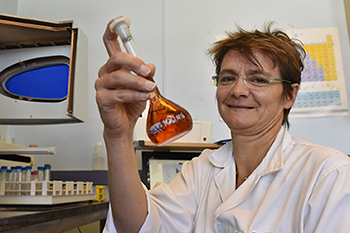Latest News Archive
Please select Category, Year, and then Month to display items
18 October 2021
|
Story Dr Nitha Ramnath

Our podcast guest
Prof Jeandrew Brink holds the post of Associate Professor in the Department of Mathematics and Applied
Mathematics within the Faculty of Natural and Agricultural Sciences at the University of the Free State. Her areas of interest include an analytical interest in Einstein field equations, dynamical systems, algorithms for testing general relativity
and the no-hair theorems, black holes, and gravitational waves. Prof Brink registered for a Bachelor of Sciences in 1998, continued with honours studies in 1999, and completed her master’s degree in 2000. Prof Brink’s research is on various
theoretical aspects of testing general relativity. She is a member of the MeerKAT telescope team that times and detect pulsars. She is also working with members of the Laser Interferometer Gravitational-Wave Observatory (LIGO) to find ways of using
gravitational waves to test Einstein’s theory.
Prof Brink was involved in the compilation of a video of geodesic orbits around a Manko-Novikov singularity, selected to be part of a Starmus 3 concert, the proceeds of which went towards promoting the Stephen Hawking Medal for Science Communication and
to support the charitable activities of the Stephen Hawking Foundation. It could also be part of a subsequent documentary.
Listen to the podcast at
François van Schalkwyk and Keenan Carelse,
UFS alumni leading the university’s United
Kingdom Alumni Chapter, have put their voices together to produce and direct the podcast series. Intended to reconnect alumni with the university and their university experience, the podcasts will be featured on the first Monday of every month,
ending in November 2021. Our featured alumni share and reflect on their experiences at the UFS, how it has shaped their lives, and relate why their ongoing association with the UFS is still relevant and important. The podcasts are authentic
conversations – they provide an opportunity for the university to understand and learn about the experiences of its alumni and to celebrate the diversity and touchpoints that unite them.
For further information regarding the podcast series, or to propose other alumni guests, please email us at
alumnipodcast@ufs.ac.za
For all Voices from the Free State podcasts,
click here.
UFS Ground Studies Laboratory receives accreditation to international standard
2016-03-18

Lore-Mari Deysel, Deputy-Director of the institute for Groundwater Studies.
Photo: Charl Devenish |
The Institute for Groundwater Studies (IGS) Laboratory at the University of the Free State is on equal footing with international testing labs. With its accreditation in March 2016 by SANAS (South African National Accreditation System), the IGS Laboratory now officially meets global standards.
Quality of water
The IGS Laboratory mainly analyses the quality of water samples. When it was originally established in 1989, the lab’s central function was to conduct testing for researchers at the institute itself. “After the public and water boards realised their need to analyse water samples, the IGS Laboratory expanded to deliver a service to these clients,” says Lore-Mari Deysel, Deputy-Director of the institute.
Since suppliers and regulatory authorities will not accept test or calibration results from a lab that is not accredited, the IGS initiated the accreditation process.
Accreditation to international standard
In order to be deemed technically competent and able to receive accreditation, labs must meet the ISO/IEC 17025 standard. ISO/IEC 17025 was first issued in 1999 by the ISO (International Organization for Standardization) and the IEC (International Electrotechnical Commission).According to Deysel, this is the single most important standard for calibration and testing laboratories around the world.
“Laboratories that are accredited to this international standard have demonstrated that they are technically competent and able to produce precise and accurate test and/or calibration data. Furthermore, it demonstrates that the university has the capacity to supply valuable and reliable services alongside the academy,” Deysel says.